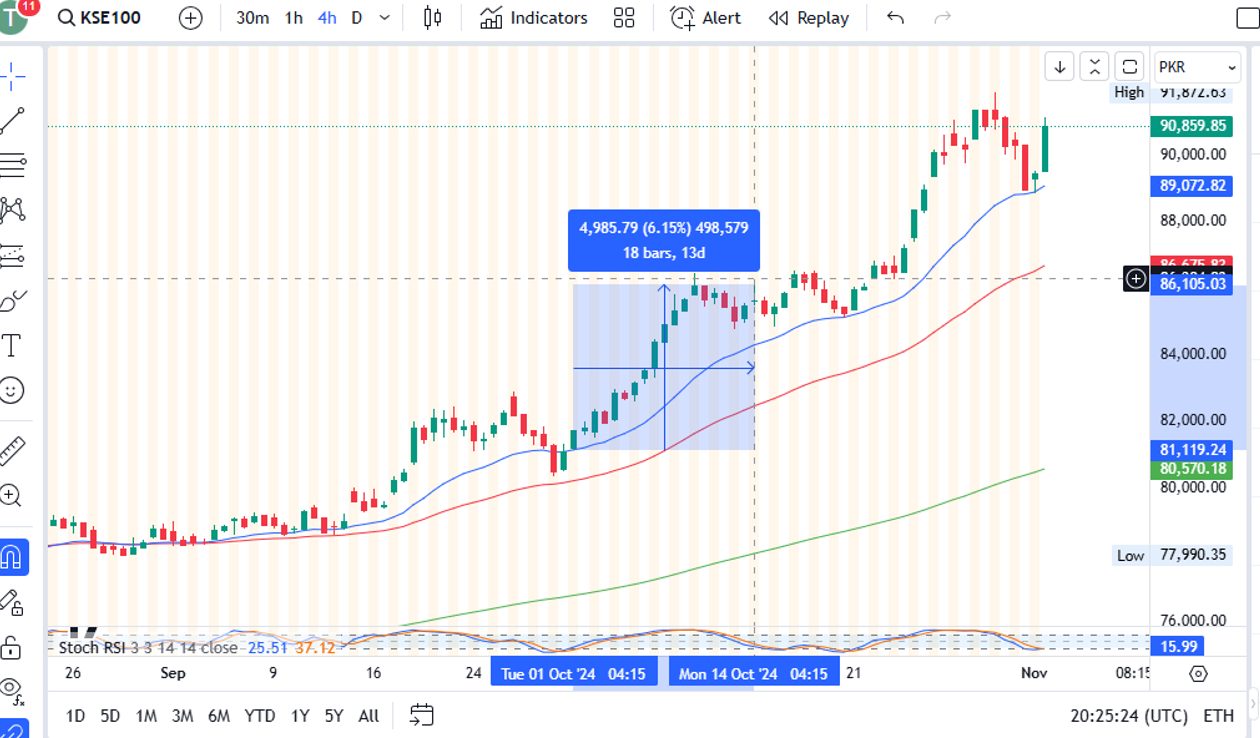CFD Trading In Pakistan



Do you want to trade rising and falling prices across Pakistani securities and global financial markets? Contracts for difference (CFDs) offer a flexible vehicle for active traders with leverage to turbocharge results.
With one of the largest populations worldwide, a diversifying economy, and growing access to the internet, Pakistan offers its young, dynamic population opportunities to trade CFDs.
In this beginner’s guide to CFD trading in Pakistan, we’ll look at the regulatory and tax landscape, plus an example of a trade on the Karachi Stock Exchange.
Quick Introduction
- CFDs let you speculate on market movements without actually owning them. You agree with a broker to exchange the difference in the price between when you open and close the trade.
- For a cash outlay, known as margin, you can leverage your trades, multiplying your potential results. This amplifies profit and loss so risk management is essential.
- The State Bank of Pakistan (SBP) deals with financial regulation but does not expressly regulate CFD providers, so residents typically use overseas brokerages.
- Traders in Pakistan may need to pay tax on CFD trading profits with higher rates up to 35% owed to the Federal Board of Revenue (FBR).
Best CFD Brokers In Pakistan
Through our personal tests, we’ve determined that these 4 CFD providers are superior for traders in Pakistan:
How Does CFD Trading Work?
A contract for difference (CFD) is a financial instrument you can trade and potentially profit from without owning the underlying asset, such as shares in publicly traded Pakistani companies like Gharibwal Cement.
Essentially, it is a financial agreement to pay the seller the difference in settlement price between a trade’s opening and closing price, with traders using CFDs to bet on whether the underlying asset’s price, in this case a share price, will rise or fall.
CFDs mimic live financial markets, and you can buy and sell these contracts the same way as other financial derivatives, using leverage to trade stocks, indices, currencies, commodities, and more in the short term.
What Can I Trade?
You can trade a range of underlying assets both in Pakistan and globally:
- Stock CFDs – Trade shares in high-performing Pakistani companies, such as First Punjab Modarba, Millat Tractors Ltd, Nestle Pakistan, or Worldcall Telecom Ltd. Alternatively take positions in well-traded stocks from US, UK, and other global markets.
- Index CFDs – Trade the KSE100 index comprising the top 100 Pakistani companies, or major global indices such as the FTSE 100, Dow Jones 30, and US Tech 100. Some CFD traders prefer indices to capitalize on a stock exchange’s overall performance rather than deal in individual stocks.
- Forex CFDs – Trade currency pairs containing the Pakistan rupee (PKR), such as USD/PKR and EUR/PKR. However, majors like EUR/USD and USD/JPY exhibit higher liquidity and generally offer more opportunities for active traders.
- Exchange-Traded Funds (ETFs) – Trade ETFs such as MIIETF Mahaana Islamic Index, MZNPETF Meezan Pakistan, and NBPGETF NBP Pakistan Growth, as well as various global funds for exposure to other sectors and markets.
- Commodity CFDs – Trade commodities like gold, silver, crude oil, wheat, and cotton given Pakistan’s significant agricultural base.
- Crypto CFDs – Trade cryptocurrency CFDs such as Bitcoin and Ethereum for fast-paced and high-risk opportunities in the evolving digital asset space, with Pakistan moving to regulate cryptos.
Is CFD Trading Legal In Pakistan?
CFD trading in Pakistan is not specifically regulated.
The State Bank of Pakistan (SBP) and the Securities and Exchange Commission of Pakistan (SECP) oversee financial regulation in the country but do not regulate CFD providers.
As a result, some residents use international brokers that offer CFDs to Pakistani traders.
We recommend choosing a provider authorized by a ‘green tier’ body in DayTrading.com’s Regulation & Trust Rating. This will help safeguard your rupees against malpractice and trading scams which catch out Pakistanis every year.
Is CFD Trading Taxed In Pakistan?
CFD traders must report trading profits to the Federal Board of Revenue (FBR), which oversees Pakistan’s tax system and collects taxes.
The tax year runs from 1 July to 30 June, and returns must be completed by 30 September.
Profits from CFD trading in Pakistan are generally taxable at a rate connected to your main source of income, and up to 35%.
| Income | Tax |
|---|---|
| Up to 600,000 | 0% |
| 600,001 – 1,200,000 | 5% |
| 1,200,000.01 – 2,200,000 – 1,200,000 | PKR 30,000 + 15% of any amount above PKR 1,200,000.01 |
| 2,200,000.01 – 3,200,000 | PKR 180,000 + 25% of any amount above PKR 2,200,000.01 |
| 3,200,000.01 – 4,100,000 | PKR 430,000 + 30% of any amount above PKR 3,200,000.01 |
| 4,100,000.01 and above | PKR 700,000 + 35% of any amount above PKR 4,100,000.01 |
Given the evolving tax landscape, I recommend consulting an advisor in or familiar with Pakistan’s latest regulations and how they could impact your obligations to ensure compliance while dealing CFDs.
A Trade Example
To bring CFD trading in Pakistan to life, here is an example of a long CFD index trade on the Karachi Stock Exchange (KSE100), executed in the 4-hour timeframe.
With price action on the daily, 4-hour, and 1-hour timeframes in a long-term uptrend, I used the momentum bounce strategy, waiting for price action to bounce off the 20-day moving average before entering the trade.
Dropping down to the 1-hour chart to get a tighter entry, I waited for the first bullish candle to close before executing the trade at 81,200.00 and setting my take profit order at 83,300.00.

Rule number one for any experienced trader is to protect your account. I always calculate the appropriate position size based on my risk management rules, never risking more than 1% of my account balance and setting a stop-loss order to manage potential losses.
After monitoring my trade closely on the 1-hour, 4-hour, and daily timeframes, my trade played out as planned, and I exited at 83,300.00.
A quick analysis of my trading plan and whether I had followed my strategy helped me review my performance, note any lessons learned, and determine how to tweak my short-term trading strategy for future CFD trades.
Bottom Line
Given the wide range of underlying assets available, CFD trading in Pakistan is an attractive proposition, but you need to keep in mind both the opportunities and the risks. For example, leverage is a double-edged sword – amplifying both gains and losses.
Also, given the lack of direct regulation of CFD trading in Pakistan, it might be best to choose an overseas broker where you know your funds are segregated and protected, and the provider adheres to international standards.
To get started, turn to DayTrading.com’s choice of the best CFD day trading platforms in Pakistan.
Recommended Reading
Article Sources
- Pakistan Stock Exchange
- Pakistan Tax Overview - PwC
- State Bank of Pakistan (SBP)
- Federal Board of Revenue (FBR)
The writing and editorial team at DayTrading.com use credible sources to support their work. These include government agencies, white papers, research institutes, and engagement with industry professionals. Content is written free from bias and is fact-checked where appropriate. Learn more about why you can trust DayTrading.com



